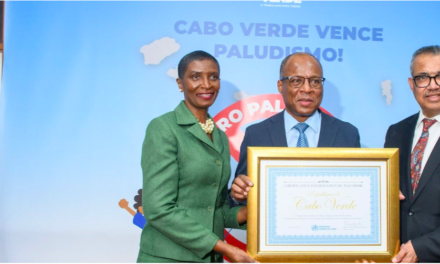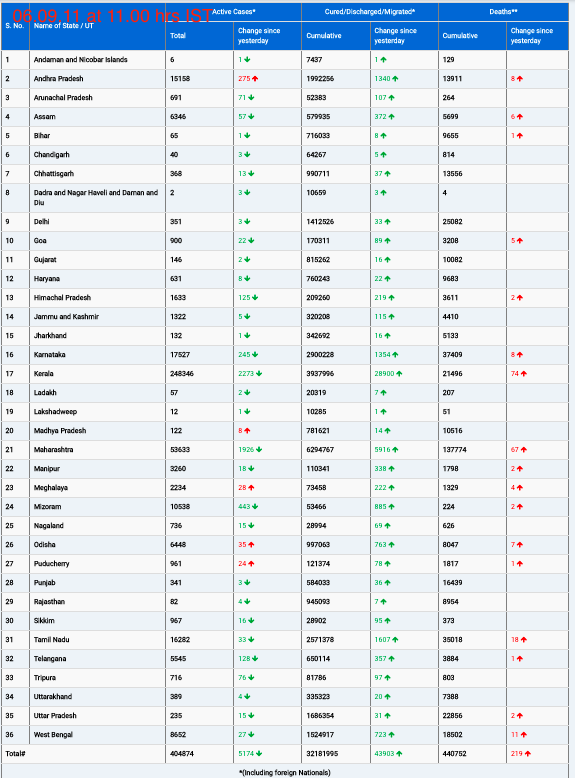On 3 December 2024, WHO joins partners around the world to commemorate the International Day of Persons with Disabilities. This year, the theme is “Amplifying the leadership of persons with disabilities for an inclusive and sustainable future”.
Persons with disabilities make up 16% of the global population, yet they rarely access leadership roles in the health sector. They commonly face numerous barriers which prevent them from accessing these roles, such as discrimination, stigma, or exclusion from education and employment opportunities. WHO recognizes that amplifying the leadership of persons with disabilities is essential to make meaningful progress in achieving global health goals, advancing health equity for all, and building a more inclusive and sustainable future.
History
The International Day of Disabled Persons was proclaimed in 1992 by United Nations General Assembly resolution 47/3. It aims to promote the rights and well-being of persons with disabilities in all spheres of society and development and increase awareness of their situation in every aspect of political, social, economic, and cultural life.
Building on many decades of UN work in the field of disability, the Convention on the Rights of Persons with Disabilities (CRPD), adopted in 2006, has further advanced the rights and well-being of persons with disabilities in implementing the 2030 Agenda for Sustainable Development and other international development frameworks.
Key facts
- An estimated 1.3 billion people experience significant disability. This represents 16% of the world’s population, or 1 in 6 of us.
- Some persons with disabilities die up to 20 years earlier than those without disabilities.
- Persons with disabilities have twice the risk of developing conditions such as depression, asthma, diabetes, stroke, obesity or poor oral health.
- Persons with disabilities face many health inequities.
- Persons with disabilities find inaccessible and unaffordable transportation 15 times more difficult than for those without disabilities.
- Health inequities arise from unfair conditions faced by persons with disabilities, including stigma, discrimination, poverty, exclusion from education and employment, and barriers faced in the health system itself.
Supporting countries to advance health equity for persons with disabilities
WHO works closely with ministries of health and relevant stakeholders, including persons with disabilities and their representative organizations, to fully integrate and promote disability inclusion in the health sector and advance health equity for persons with disabilities. We support countries in their work to ensure persons with disabilities:
- have equitable access to effective health services;
- are included in health emergencies preparedness and responses; and
- can access cross-sectoral public health interventions to achieve the highest attainable standard of health.
Building on from the WHO Global Report on Health Equity for Persons with Disabilities, WHO has developed the Health equity for persons with disabilities: Guide for action (or Disability inclusion guide for action). It provides technical guidance on the process that ministries of health should lead on to integrate disability inclusion into existing health systems governance, planning, and monitoring. The process is organized in a cycle of four overlapping and continuous phases:
- Prepare for the Disability inclusion guide for action by identifying and engaging relevant stakeholders.
- Assess the situation of disability inclusion in all of the strategic entry points across the health system, such as governance, financing, physical infrastructure, service delivery, or health information systems.
- Design disability inclusive actions for the health sector, prioritizing areas and identifying available resources.
- Implement and monitor disability inclusive actions in health sector policies, plans and programmes.
Factors contributing to health inequities
Health inequities arise from unfair conditions faced by persons with disabilities.
Structural factors: Persons with disabilities experience ableism, stigma and discrimination in all facets of life, which affects their physical and mental health. Laws and policies may deny them the right to make their own decisions and allow a range of harmful practices in the health sector, such as forced sterilization, involuntary admission and treatment, and even institutionalization.
Social determinants of health: Poverty, exclusion from education and employment, and poor living conditions all add to the risk of poor health and unmet health care needs among persons with disabilities. Gaps in formal social support mechanisms mean that persons with disabilities are reliant on support from family members to engage in health and community activities, which not only disadvantages them but also their caregivers (who are mostly women and girls).
Risk factors: Persons with disabilities are more likely to have risk factors for non-communicable diseases, such as smoking, poor diet, alcohol consumption and a lack of physical activity. A key reason for this is that they are often left out of public health interventions.
Health system: Persons with disabilities face barriers in all aspects of the health system. For example, a lack of knowledge, negative attitudes and discriminatory practices among healthcare workers; inaccessible health facilities and information; and lack of information or data collection and analysis on disability, all contribute to health inequities faced by this group.
Initiatives by the Indian Government
India has made significant strides in promoting the rights and inclusion of Divyangjan through various policies and campaigns. A few of these initiatives are listed below:
Department of Empowerment of Persons with Disabilities
In order to give focused attention to policy issues and meaningful thrust to the activities aimed at the welfare and empowerment of Persons with Disabilities (PwDs), a separate Department of Disability Affairs was carved out of the Ministry of Social Justice and Empowerment on May 12, 2012. The Department was renamed the Department of Empowerment of Persons with Disabilities on December 8, 2014. The Department acts as a nodal agency for matters pertaining to disability and persons with disabilities, including effecting closer coordination among different stakeholders: related Central Ministries, State/UT Governments, NGOs, etc., in matters pertaining to disability.
Accessible India Campaign
The Accessible India Campaign (Sugamya Bharat Abhiyan), launched on December 3, 2015 aims to achieve universal accessibility for Persons with Disabilities (PwDs) across India.The key focus areas include improving Built Environment Accessibility in public spaces, enhancing Transportation Accessibility for independent mobility, creating an accessible Information and Communication ecosystem, and expanding Sign Language Access through interpreter training and better media support.
Deendayal Divyangjan Rehabilitation Scheme (DDRS)
DDRS is a central sector scheme to provide grant-in-aid to non-governmental organizations (NGOs) for projects relating to the rehabilitation of persons with disabilities aimed at enabling persons with disabilities to reach and maintain their optimal, physical, sensory, intellectual, psychiatric, or socio-functional levels. The scheme aims to create an enabling environment to ensure equal opportunities, equity, social justice, and empowerment of persons with disabilities and to encourage voluntary action to ensure effective implementation of the Rights of Persons with Disabilities Act, 2016.
District Disability Rehabilitation Centre (DDRC)
The District Disability Rehabilitation Centre (DDRC) aims to address the needs of persons with disabilities through a multifaceted approach. Its objectives include early identification and intervention, raising awareness, and assessing the need for assistive devices along with their provision and fitment, arrangement of loans for self-employment and more. Additionally, it acts as an outreach center for services provided by National Institutes and works to promote a barrier-free environment for individuals with disabilities.
Assistance to Persons with Disabilities for Purchase/Fitting of Aids/ Appliances (ADIP) Scheme.
The main objective of the Scheme is to provide grants-in-aid to the various implementing agencies (National Institutes/Composite Regional Centers/Artificial Limbs Manufacturing Corporation of India. (ALIMCO)/District Disability Rehabilitation Centers/State Handicapped Development Corporations/ other Local Bodies/NGOs) so that they are in a position to assist needy persons with disabilities in procuring durable, sophisticated and scientifically manufactured, modern, standard aids and appliances to promote their physical, social and psychological rehabilitation by reducing the effects of disabilities and at the same time enhancing their economic potential.
Schemes For Implementation Of Rights of Persons With Disabilities Act 2016 (SIPDA)
The Scheme for Implementation of the Rights of Persons with Disabilities Act, 2016 (SIPDA) is a comprehensive “Central Sector Scheme” that encompasses 10 sub-schemes following its revision during the Expenditure Finance Committee (EFC) meeting on 11th August 2021. This revised scheme, approved by the Hon’ble Finance Minister, is designed to operate from 2021–22 to 2025–26. The sub-
schemes under the SIPDA umbrella are as follows:
- Creation of Barrier-Free Environment (BFE) for Persons with Disabilities.
- Accessible India Campaign (AIC) to enhance accessibility.
- National Action Plan (NAP) for Skill Development for Persons with Disabilities (PwDs).
- Unique Disability Identification (UDID) Project for issuing UDID cards.
- Awareness Generation and Publicity (AGP) combined with in-service training and
- sensitization of key government functionaries, local bodies, and other stakeholders.
- .Financial support to Study and Research on priority areas of disability sector and to
- Research & Development of suitable product, aids & appliances for empowerment of PwDs
- Assistance to Spinal Injury Centers, new name after merger of State Spinal Injury Centre
- (SSIC) and Indian Spinal Injury Centre(ISIC) sub-schemes.
- Cross Disability Early Intervention Centres (CDEIC) to address disabilities at an early stage.
- Sub-schemes categorized as Projects under SIPDA, such as:
- The Braille Press Scheme, implemented through NIEPVD, Dehradun.
- Financial support for existing Deaf Colleges in five regions, executed
- through AYJNISHD, Mumbai.
- Establishment of a Central Project Monitoring Unit (CPMU) cum Data Strategy Unit
- (DSU) for effective implementation and data management.
These components collectively aim to empower persons with disabilities, ensuring accessibility, inclusivity, and holistic development.
Divya Kala Mela
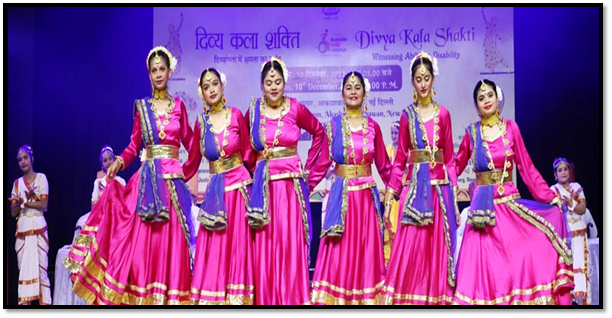
The Divya Kala Mela is a national-level fair dedicated to Divyangjan and represents a significant milestone in India’s journey toward inclusivity and empowerment of the Divyangjan, or differently-abled individuals. Historically, artisanship in India has been a source of identity and livelihood for many communities. For centuries, crafts have been passed down through generations, weaving together local traditions and skills. However, the participation of Divyang artisans has often been overlooked. The establishment of the Divya Kala Mela marks a pivotal shift in recognizing and celebrating the contributions of these artisans.
PM-DAKSH
PM-DAKSH (Pradhan Mantri Dakshta Aur Kushalta Sampann Hitgrahi) Yojana is a one-stop destination for Persons with Disabilities (PwDs), skill training organizations, and employers across India to be a part of the National Action Plan for Skill Development of Persons with Disabilities implemented by the Department of Empowerment of Persons with Disabilities (DEPwD). Under this portal, there are two modules:
- Divyangjan Kaushal Vikas: Skill training is conducted for PwDs through the portal across the country.
- Divyangjan Rozgar Setu: The platform aims to act as a bridge between PwDs and employers having jobs for PwDs. The platform provides geo-tagged based information on employment/earning opportunities within private companies as well as PwDs across India.
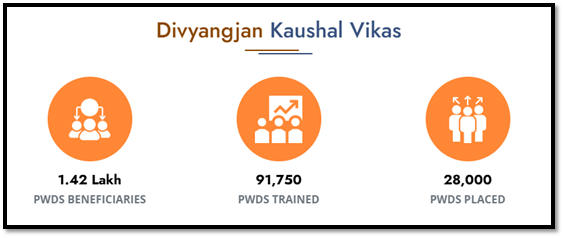
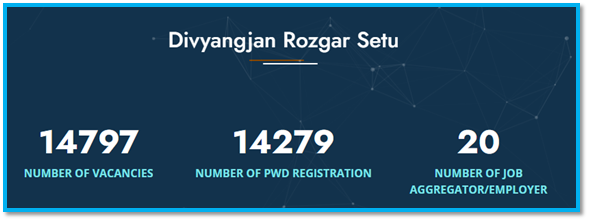
Conclusion: Advancing an Inclusive Future
The International Day of Persons with Disabilities (IDPD) serves as a call to action for nations to recognize the potential of persons with disabilities as active contributors to society. India’s initiatives exemplify the progress toward an inclusive and equitable future. As the global community comes together, the message remains clear: a truly sustainable and peaceful world can only be achieved by ensuring the full participation and leadership of everyone.





